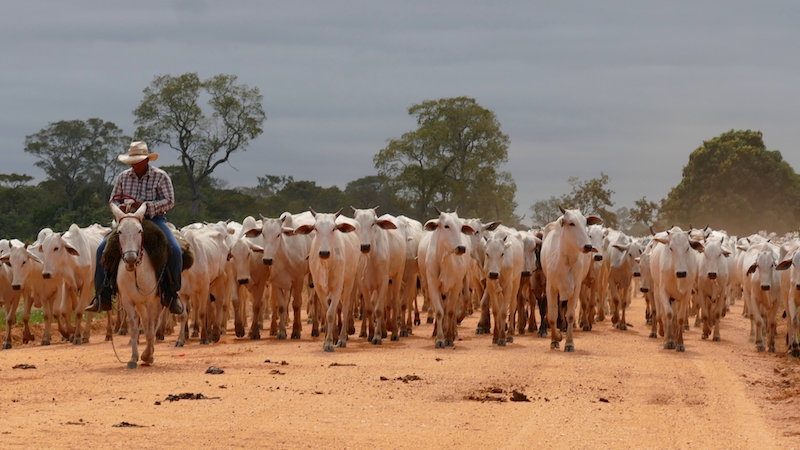Deforestation in Brazil’s Amazon jumped almost 50% during the three month electoral season that brought Jair Bolsonaro to power, according to preliminary official figures.
That means the forest lost 1,674 sq km from August to October, an area more than double the size of New York City.
The main culprit was the conversion of forest to pasture. The largest increase was in the border area between Acre and Amazonas states. The deforestation increase there, compared with the same period in 2017, was 273% and 114%, respectively.
Deforestation usually increases in Brazil’s electoral years, amid promises from local politicians they will open up protected land or make environmental legislation more flexible if elected.
Climate news in your inbox? Sign up here
But during the 2018 campaign, far-right candidate and now president-elect Bolsonaro added a powerful permissive voice. In a nod to agribusiness, land-grabbers, and illegal gold miners and loggers, he repeatedly criticized Brazil’s environment agency Ibama’s supervision, calling it excessive and ideologically biased.
As a result Bolsonaro, collected landslide victories in Amazon regions with higher deforestation rates. A survey revealed long-term deforestation rates in pro-Bolsonaro municipalities were more than two and a half times higher than in municipalities that voted for leftist candidate Fernando Haddad (PT) in the first round.
Under heavy criticism from Bolsonaro during the campaign, federal environment agents have faced mounting opposition in the field. Several CHN spoke to have had warnings from illegal loggers and miners that “things will change” under Bolsonaro.
There were three attacks against federal agents during the campaign. The most serious one took place on October 19 in Pará state. A group of federal agents from ICMBio (the agency in charge of conservation area management) were trapped while returning from a raid after criminals burned a small bridge.
The team had to improvise another bridge and was rescued by Pará state police, which withdrew its support for ICMBio soon after the incident citing lack of security. As a response, the federal government had to dispatch the National Public Security Force, only used in exceptional situations, to the region.
The new figures on forest loss come from Deter B, a satellite monitoring system developed by Brazil’s National Institute for Space Research (Inpe) in order to monitor deforestation in almost real time for surveillance purposes. The data is publicly available and the calculation of the rate over the electoral season was made by Inpe at Climate Home News’ request.
Brazil’s official annual deforestation rate is calculated by Inpe’s Prodes project, which has a more precise resolution. Both system, however, usually present similar results.
Cláudio Almeida, Inpe’s Amazon monitoring coordinator, warned Deter B is more liable to suffer interference from cloudiness and other variables. But, he said the almost 48.8% difference with last year indicated the deforestation rate was unmistakably higher.
“Literature shows that several factors lead to an increase in deforestation: real estate speculation, expansion of the agricultural frontier, new infrastructures such as roads and ports and expectations of regional development,” he said.
The increase of the past three months, however, will only be officially accounted in 2019. The reason is that the Prodes uses data from August 2017 to July.
The 2018 deforestation rate is expected to be published in the next weeks and will most likely show a small increase from 2017.
US funds with big Amazon farming stakes face Bolsonaro choice
After the election, Bolsonaro said he will no longer merge the ministry of environment into the ministry of agriculture, a campaign promise. The agribusiness and beef lobbies, close allies of the president-elect, advised him against it, as the environment ministry has other obligations outside agricultural affairs, such as oil and mining licensing.
The president-elect, however, has made clear that he will not choose an environmentalist to lead the department charged with protecting the Amazon and that the future selection minister will need agribusiness’ pre-approval.
Last week, Bolsonaro chose congresswoman Tereza Cristina, the leader of the farm caucus, to be his minister of agriculture. Cristina is an agronomist from the state of Mato Grosso do Sul, which has a cattle population of 21.5 million and a human population of 2.6 million.
Brazil’s Jair Bolsonaro is the environmental story of 2018.
No-one is better positioned than CHN’s Fabiano Maisonnave to cover the impact of his presidency on the world’s most important forest. We are the only international news site with a correspondent living in the heart of the Amazon. You can read some of the great reporting Fabiano has already done for us here.
We know we need to keep on this story, but after a huge 2018 and with the biggest UNFCCC talks in years approaching, our resources are really stretched. Please help us to keep Fabiano writing by making a small donation through our Patreon account.
A recent report by Indigenous Missionary Council (Cimi), an arm of the Catholic church, includes Cristina in a list of 50 Congressmen with anti-indigenous rights record. Among other actions, in last August she petitioned President Temer to revoke a decree of 2007 that established the national policy for the sustainable development of traditional peoples and communities.
According to the request co-signed by Cristina, the decree “stimulate and cause acts that challenge the order and the security. What’s more, it violates the constitutional guarantee of private property and human dignity, imposing on the land owners the loss of its lands, its productions and their family livelihood.”
